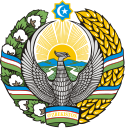
Back سياسة أوزبكستان Arabic Özbəkistanın dövlət quruluşu Azerbaijani Държавно устройство на Узбекистан Bulgarian Politique en Ouzbékistan French פוליטיקה של אוזבקיסטן HE Politica dell'Uzbekistan Italian ウズベキスタンの政治 Japanese უზბეკეთის პოლიტიკური სისტემა Georgian Uzbekijos politinė sistema Lithuanian Política do Uzbequistão Portuguese
This article has multiple issues. Please help improve it or discuss these issues on the talk page. (Learn how and when to remove these template messages)
|
 |
|---|
|
|
| Government |
|
|
The Republic of Uzbekistan is a presidential constitutional republic, whereby the President of Uzbekistan is head of state. Executive power is exercised by the government and by the Prime Minister of Uzbekistan.
Legislative power is vested in the two chambers of the Oliy Majlis, the Senate and the Legislative Chamber. The judicial branch (or judiciary), is composed of the Supreme Court, Constitutional Court, and Higher Economic Court that exercises judicial power.
The movement toward economic reform in Uzbekistan has not been matched by a movement toward political reform. The government of Uzbekistan has instead tightened its grip since independence (September 1, 1991), cracking down increasingly on opposition groups. Although the names have changed, the institutions of government remain similar to those that existed before the breakup of the Soviet Union.
The government has justified its restraint of public assembly, opposition parties, and the media by emphasizing the need for stability and a gradual approach to change during the transitional period, citing the conflict and chaos in the other former republics (most convincingly, neighbouring Tajikistan). This approach has found credence among a large share of Uzbekistan's population, although such a position may not be sustainable in the long run.
Despite the trappings of institutional change, the first years of independence saw more resistance than acceptance of the institutional changes required for democratic reform to take hold. Whatever initial movement toward democracy existed in Uzbekistan in the early days of independence seems to have been overcome by the inertia of the remaining Soviet-style strong centralized leadership.
© MMXXIII Rich X Search. We shall prevail. All rights reserved. Rich X Search